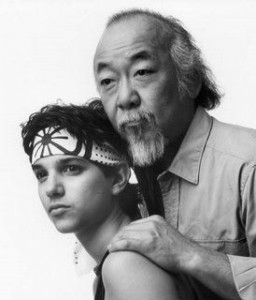
Creepy much?
Just about everyone I know has been asking the same question lately: “Huh? ‘Karate’ Kid? Shouldn’t it be ‘Kung Fu’ Kid?”
With the massive ecological disaster in the Gulf of Mexico, controversy over illegal immigration, high unemployment, the still-tanking world economy, collapsing European nations, growing government bureaucracy, multiple wars, poverty, starvation, and Lindsey Lohan, America is getting bored and needs something real to worry about. Enter “The Karate Kid.”
Why “Karate” instead of “Kung Fu?” It’s obvious that it was done for brand name recognition. Hollywood normally presumes that most Americans is even stupider than they is, and don’t want to bewilder the monkeys. Can you imagine the confusion over naming a remake of “The Dukes of Hazzard” something like “Them Crazy Rednecks?” What would’ve happened had the writers of “The A Team” remake not inserted the line “… this Alpha Unit, or ‘A-Team'” so that the viewing public wouldn’t get uneasy with all that jargony Army stuff?
I wouldn’t be surprised if the makers of “The Karate Kid,” hip to the throngs of people asking why it isn’t “The Kung Fu Kid,” didn’t throw in some dialogue to placate the herd:
- Fresh Prince, Jr.: “Hey, you’re just like Mr. Miyagi, and I’m like the Karate Kid.”
- Jackie Chan: “No. Not Karate. Kung Fu. See, Karate comes from Okinawa. The Japanese later adopted, Japanized, and spread the art through the world, but it’s originally an Okinawan art (which, by the way, originally came from China). Kung Fu means ‘hard work’ in Chinese, and it is a Chinese art. I am Chinese. I speak Chinese. We are filming in China. Do you understand the words that are coming outta my mouth?”
- FPJ: “Whatever, man… you crazy.”
Or something like that.
Here’s a history/language lesson for those who give a crap:
Karate was originally developed in Okinawa, but has strong Chinese roots. In fact, the Chinese characters originally used to write it are 唐手, which means “China (T’ang Dynasty) Hand.” (Interestingly, the Koreans still use this nomenclature in the form of Tang Soo Do – 唐手道 – way of the China Hand.) In most areas in Okinawa, the art was often referred to by the name of the region in which it was practiced, e.g. Naha-Hand, Shuri-Hand, etc. After Funakoshi Gichin brought the art to Japan, the Japanese said, “Uh… yeah… we’re not comfortable with all that ‘China’ stuff, so if you could just go ahead and change that first character, that’d be great, mmmkay?” So, it was decided that they (the Japanese) would use another character which was (and still is) also pronounced ‘kara.’ Enter 空手 (empty hand).
Kung Fu is written 功夫 in Chinese, and basically means something like “skill earned through hard work.” I like to think that this name actually originated from a joke. Imagine some white tourists shlepping around the Chinese countryside, when they happen upon some monks training in the fields. One corpulent tourist asks the tour guide, “Hey… what’s that stuff?” The tour guide replies, “Kung Fu (snicker).” The tourist is so pleased with his new knowledge, that he fails to notice the tour guide elbowing the bus driver in the ribs, saying, “Did you hear that? I told him it was ‘hard work.’ Now he thinks that’s what the art is called! BWAAAAHAHAHAHAHA…”
Wushu is more likely what they’re doing in the movie (just speculation, as I haven’t seen it yet.) This is where things get weird. Wushu is written 武術 in Chinese. (In Japanese, that word is pronounced Bujutsu.) Wushu literally means “martial art,” but is more often used today to describe the showy, gymnastic-y, flashy stuff that came about after the Communists killed off, or drove into exile, all the truly powerful Chinese martial artists, only to later realize that they needed something culturally uniquely Chinese in nature to show the world how awesome they are. In China, Wushu is for showing off athleticism. In Japan, Bujutsu describes the “old school” combat systems.
I blame Mao.
